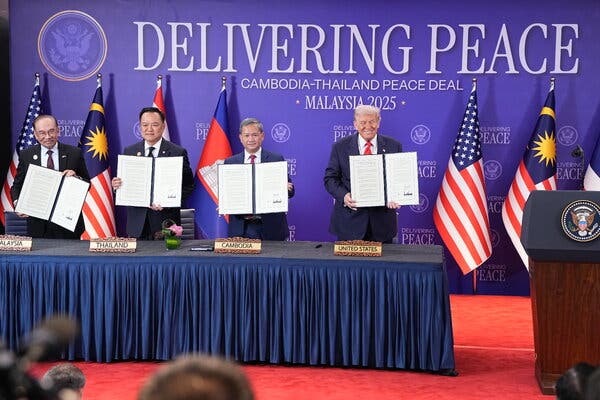President Donald Trump oversaw the signing of significant agreements with Cambodia and Thailand during a diplomatic visit on October 10, 2023. The agreements include a trade deal with Cambodia and a critical minerals pact with Thailand, aimed at enhancing economic ties between the nations. This diplomatic engagement sets the stage for upcoming discussions with China’s leader, Xi Jinping, which will pose a substantial challenge for the Trump administration.
The trade deal with Cambodia focuses on increasing bilateral trade and fostering investment opportunities. This initiative is expected to benefit both nations economically, with projections suggesting a potential increase in trade volumes by as much as 20% over the next year. The agreement is particularly significant for Cambodia, which relies heavily on exports to the United States.
In addition to the trade agreement, the critical minerals pact with Thailand aims to bolster cooperation in the extraction and supply chain of essential minerals. These minerals, crucial for technology and renewable energy sectors, have become increasingly important amid global supply chain concerns. The partnership is designed to enhance regional stability and economic resilience, with both nations recognizing the strategic importance of securing a reliable supply of these resources.
As President Trump prepares for talks with Xi Jinping, the outcomes of the recent agreements may influence the dynamics of U.S.-China relations. Trade tensions between the two nations have been a focal point of Trump’s administration, and the upcoming discussions are anticipated to address ongoing issues, including tariffs and intellectual property rights.
The diplomatic visit underscores the Trump administration’s commitment to strengthening alliances in Southeast Asia. By forging closer ties with Cambodia and Thailand, the United States seeks to counterbalance China’s growing influence in the region. The administration emphasizes that these partnerships are not merely economic but also strategic, reflecting a broader vision for enhanced cooperation among like-minded nations.
Moving forward, the success of these agreements will largely depend on the willingness of both parties to adhere to their commitments. Observers note that the real test lies ahead as President Trump approaches negotiations with Xi Jinping, where the stakes are considerably higher. The outcomes of these discussions could shape not only U.S. foreign policy but also the economic landscape of the Asia-Pacific region.
In conclusion, the recent agreements with Cambodia and Thailand mark a significant step in the Trump administration’s foreign policy strategy. As the President prepares for critical negotiations with China, the effectiveness of these partnerships will be closely watched by global leaders and economic analysts alike.







